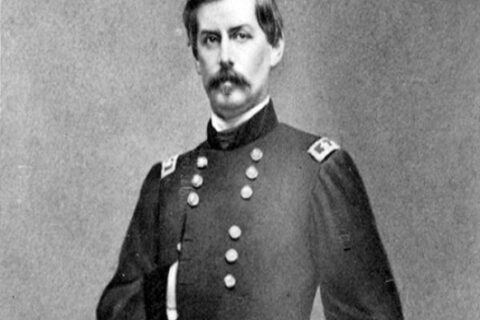VDare took the opportunity upon the release of Lin Manuel Miranda’s great monument to cultural appropriators to point out that if Alexander Hamilton had gotten his way, Miranda would probably have lived as a nameless street-rat in Puerto Rico rather than the pampered son of one of Ed Koch’s diversity hires. In doing so, they published a rather scathing take-down written by Hamilton attacking his chief political enemy and favorite object of hatred, President Thomas Jefferson. It was quite a lot of fun and brilliantly executed on VDare’s part.
The attack was against Jefferson’s proposed plan on naturalization of immigrants (this being long before the abomination of birth-right citizenship was made to sit upon the high place with the Fourteenth Amendment). The great Southern philosophe, however, was not permitted to defend himself against the attack, though a defense was ready-made, waiting in his Notes on the State of Virginia – a work that ought to occupy a high place on any Dixian’s reading list, if only to acquaint himself with the thought of one of the great minds to have been produced by the South.
Let’s let Jefferson speak for himself first, since it’s a relatively short excerpt, and then we’ll reflect briefly on it:
Here I will beg leave to propose a doubt. The present desire of America is to produce rapid population by as great importations of foreigners as possible. But is this founded in good policy? The advantage proposed is the multiplication of numbers. Now let us suppose (for example only) that, in this state, we could double our numbers in one year by the importation of foreigners; and this is a greater accession than the most sanguine advocate for emigration has a right to expect. Then I say, beginning with a double stock, we shall attain any given degree of population only 27 years and 3 months sooner than if we proceed on our single stock. If we propose four millions and a half as a competent population for this state, we should be 54 1/2 years attaining it, could we at once double our numbers; and 81 3/4 years, if we rely on natural propagation…
I have taken the term of four millions and a half of inhabitants for example’s sake only. Yet I am persuaded it is a greater number than the country spoken of, considering how much inarrable land it contains, can clothe and feed, without a material change in the quality of their diet. But are there no inconveniences to be thrown into the scale against the advantage expected from a multiplication of numbers by the importation of foreigners? It is for the happiness of those united in society to harmonize as much as possible in matters which they must of necessity transact together. Civil government being the sole object of forming societies, its administration must be conducted by common consent. Every species of government has its specific principles. Ours perhaps are more peculiar than those of any other in the universe. It is a composition of the freest principles of the English constitution, with others derived from natural right and natural reason. To these nothing can be more opposed than the maxims of absolute monarchies. Yet, from such, we are to expect the greatest number of emigrants. They will bring with them the principles of the governments they leave, imbibed in their early youth; or, if able to throw them off, it will be in exchange for an unbounded licentiousness, passing, as is usual, from one extreme to another. It would be a miracle were they to stop precisely at the point of temperate liberty. These principles, with their language, they will transmit to their children. In proportion to their numbers, they will share with us the legislation. They will infuse into it their spirit, warp and bias its direction, and render it a heterogeneous, incoherent, distracted mass.
I may appeal to experience, during the present contest, for a verification of these conjectures. But, if they be not certain in event, are they not possible, are they not probable? Is it not safer to wait with patience 27 years and three months longer, for the attainment of any degree of population desired, or expected? May not our government be more homogeneous, more peaceable, more durable? Suppose 20 millions of republican Americans thrown all of a sudden into France, what would be the condition of that kingdom? If it would be more turbulent, less happy, less strong, we may believe that the addition of half a million of foreigners to our present numbers would produce a similar effect here. If they come of themselves, they are entitled to all the rights of citizenship: but I doubt the expediency of inviting them by extraordinary encouragements.
Let’s contextualize first. It is 1781; America has just won its independence, and American moneyed elites are eager to import as many foreigners as possible to swell the population and increase economic output (wait… this sounds familiar.) Preceding this, Jefferson has discussed how Virginia’s population has doubled itself once every 27 years or so; and this has indeed had very salubrious effects on Virginian economy and society. The problem is not with population growth, but the mode of growth. This is a purely practical concern.
What Jefferson says about government is of far greater interest, however. He opens his digression with a typical statement of Enlightenment universalism, namely that all government derives from consent of the governed. Then, however, he takes what is a typical Southern articulation of human governance: not only that there are multiple species of government, but that these species of government have a clear and explicit tie to the discrete population from which they arise. America has a distinctly and explicitly American government, which does not apply to other discrete population groups; it is for this reason that Jefferson spoke in his inaugural address that he would honor fellow Virginian Washington’s call to avoid “entangling alliances”, and fellow Virginian Monroe’s formal condemnation of Imperialism as a doctrine of foreign policy, decidedly rejecting Alexander Hamilton’s assertion in his Camillus essays that “we are the embryo of a great empire.” More than this, though, it also asserts that nations produce governments, and not the other way around.
What nation produced the American government, this unique entity in the world? The English nation – the Anglo-Saxon people upheld as the racial basis for the whole of the South by every vocal defender of the South from Calhoun to Davis right up to Governor Wallace and Sam Dickson. What happens if this people is displaced? What is the result of importing en masse a foreign horde from a part of the world in which despotism is the only experienced reality they have? Precisely what history has demonstrated, precisely the result Jefferson predicts: a nation that has been warped, rendered into a “heterogeneous, incoherent, distracted mass”.
This is what we must escape: the result of Jefferson’s advice for Virginia being ignored, and our people thereby suffering under a regime of immigration reform, which provided precisely those “extraordinary encouragements” which have flooded our nation with masses of peoples from lands more despotic and more foreign to the spirit of our Anglo-Celtic folk than Jefferson might ever have found in his most febrile nightmares. If even a man as moderate—indeed, as liberally-minded—as Jefferson could see this most basic truth of demographic change and exchange, how utterly foreign to the spirit of our people is the support for mass unmonitored immigration, state-sponsored refugee resettlement, and indeed the entire (((narrative))) of the “melting-pot”.





Great piece Lpantera. I always enjoy pieces that connect us to our past, and tap its great men for wisdom. I have read “Notes on the State of Virginia”, and it is indeed a valuable work.
The Jefferson quote that you used: “They will bring with them the principles of the governments they leave, imbibed in their early youth; or, if able to throw them off, it will be in exchange for an unbounded licentiousness, passing, as is usual, from one extreme to another. ” That is a brilliant observation, and it applies to our present time. That could serve as the basis of a future piece.